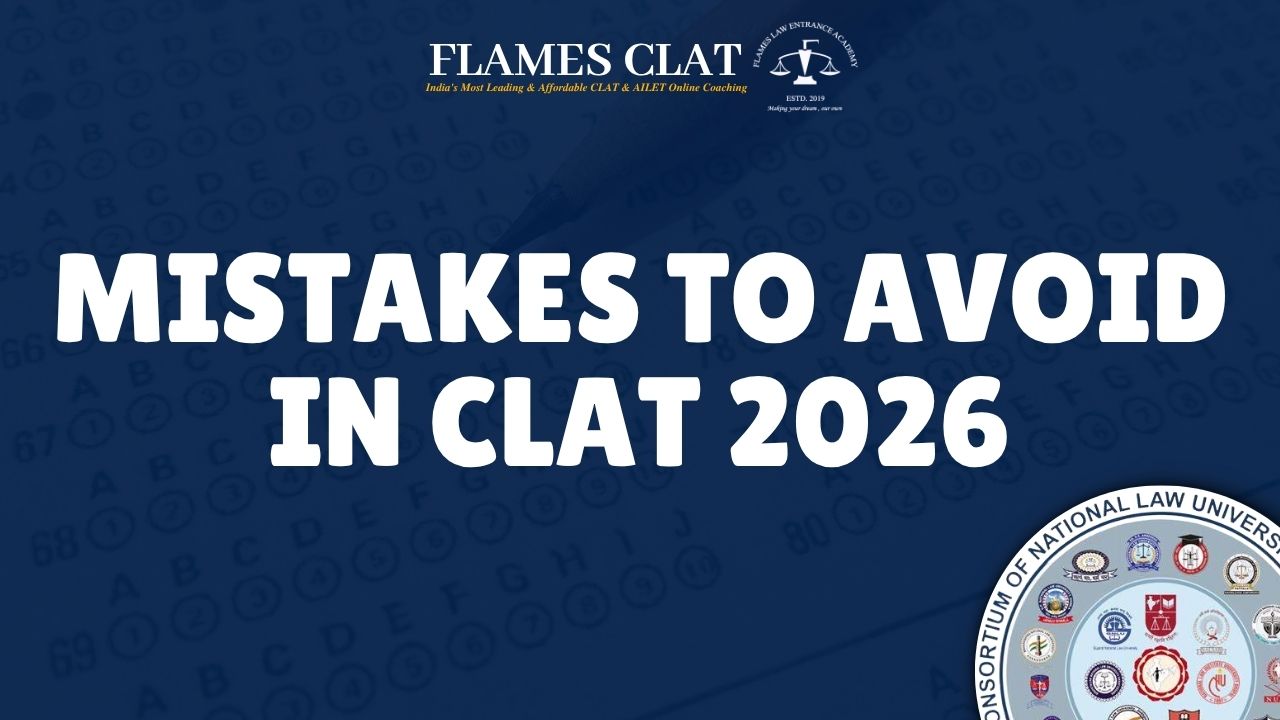Mistakes to avoid in CLAT 2026
For thousands of law students throughout India, the Common Law Admission Test (CLAT) 2026 is the first step towards admission to esteemed National Law Universities (NLUs). Your CLAT 2026 preparation process necessitates accuracy, planning, and unwavering focus because the exam is scheduled for December 2025. But even the hardest-working students stumble because of little-known traps that can ruin months of effort. Avoiding these CLAT blunders, such as squandering on practice exams or failing to pay attention to subtleties in the syllabus, frequently distinguishes top scorers from the rest.
This blog explores the most frequent mistakes made in CLAT practice exams and other situations, providing practical advice on how to avoid them.
1.Ignoring the exam pattern and syllabus:
Treating the syllabus more like a rough outline than a road map is one of the worst mistakes you can make in the CLAT. The CLAT 2026 pattern places a strong emphasis on comprehension-based questions in the areas of current affairs, legal reasoning, logical reasoning, English, and quantitative techniques. Without following the official plan, many candidates jump right into generic study materials, wasting time on unrelated subjects.
To read more: WHAT IS CLAT? SYLLABUS AND PATTERN
2. Ignoring CLAT Mocks
Despite the fact that CLAT mock exams are mandatory, a startling proportion of students view them as optional customs. The opportunity to simulate the 120-question, 120-minute pressure cooker is lost if mocks are skipped. Even worse, many people take them occasionally without giving them much thought, making mistakes like misallocating their time. Avoid this by scheduling weekly full-length mocks from day one. Post-test, dissect your performance: categorize errors, track section-wise accuracy, and revisit weak areas. Flames CLAT's mock series, modelled on past trends, includes video solutions and personalized feedback—helping students improve by 15-20 marks per cycle. Remember, mocks aren't just practice; they're your diagnostic tool for peak performance.
3. Using too many resources and ignoring revision
Aspirants accumulate resources ten GK compilations, countless reasoning apps—in their pursuit of the perfect book, which causes them to become paralyzed by analysis. This overload weakens concentration and leaves no time for revision, which is essential for remembering current events from the previous 12 months. Limit each section to two or three reliable sources. Create a revision schedule that includes biweekly full-subject reviews and daily 30-minute GK flashcards.
Pro tip: To solidify knowledge, employ active recall strategies, such as explaining ideas to a peer. This targeted strategy consistently outperforms volume.
Check Out: MASTER MINDS'S TREASURE - 09 SETS OF CLAT BOOKS
4. Undervaluing legal reasoning and current affairs
Although general knowledge is frequently dismissed as cram-at-the-end material. Students who memorize bare acts rather than applying principles to hypotheticals are also thwarted by legal reasoning. Use daily news reading to counter this; for policy insights, concentrate on The Hindu editorials. Using Flames CLAT's case study exercises, legal students can practice identifying principles in rulings. This is low effort, high reward territory that can propel your rank, so aim for 80% accuracy.
Check This Out: HOW TO PREPARE CURRENT AFFAIRS FOR CLAT 2026?
5. Ineffective Time Management and Neglecting Health
Long study sessions without breaks are causing a lot of burnouts, which impairs focus and encourages careless errors like OMR bubbling errors. In a timed exam, wasting ten minutes on a single quantitative puzzle is a major time waster.
Include weekly off days and the Pomodoro technique (25 minutes of study time, followed by a 5-minute break). To improve cognitive function, make sleep (7-8 hours) and moderate exercise a priority. Practice rigorous sectional timing during mocks: 30 minutes for reasoning and 30 minutes for English. This holistic preparation is emphasized in Flames CLAT's wellness workshops.
6. Ambiguous Objectives and Absence of Guidance
Procrastination is encouraged by vague goals like study daily that lack metrics. Additionally, blind spots remain unchecked due to self-study isolation. Establish SMART objectives, such as Solve 50 LR passages weekly. For peer motivation and doubt-clearing sessions, sign up for a coaching ecosystem such as Flames CLAT. Keep a journal of your progress and mark significant occasions to keep things moving forward.
Must Watch: What to do/Checklist for in the Last 2 Months for CLAT 2026 by Siddharth Sir, FLAMES CLAT
Conclusion
Although preparing for CLAT 2026 is a marathon filled with obstacles, you can set yourself up for success by avoiding these common mistakes, such as mock neglect and syllabus blind spots. To reach your full potential, embrace balanced routines, focused resources, and organized mocks. Keep in mind that every top performer has made mistakes; success is defined by getting up smarter.
With expert-led strategies that have helped students get into NLU programs year after year, we at Flames CLAT are dedicated to your journey. Sign up for our 2026 batch now for specialized instruction that transforms mistakes into powerful manoeuvres.
Join our Flames CLAT Family at https://t.me/flamesclat
For Informative videos, do check out https://youtube.com/@flamesclat?si=-PqiaRLEjutM-iYj




Write a Review
Your email address will not be published. Required fields are marked *